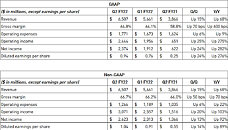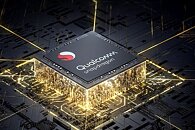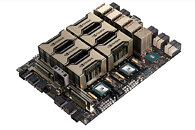
AMD Chair & CEO Dr. Lisa Su to Keynote at COMPUTEX 2022 on the AMD High-Performance Computing Experience
AITRA (Taiwan External Trade and Development Council) announced today that Dr. Lisa Su, Chair and CEO of AMD, is invited back to be the first speaker of the COMPUTEX 2022 CEO Keynote series. This digital keynote will take place on Monday, May 23, at 2:00 PM (UTC+8), with the keynote theme "AMD Advancing the High-Performance Computing Experience". Dr. Lisa Su is delighted and honored to join COMPUTEX again, marking her third occasion delivering a CEO Keynote at the pre-eminent global conference. "High-performance computing plays such an essential role in our daily lives, and AMD is committed to always pushing the envelope on performance and innovation. At this year's COMPUTEX, AMD will share how we accelerate innovation with our broad ecosystem of partners," said Dr. Lisa Su.
AMD is the high-performance and adaptive computing leader with the industry's strongest portfolio of leadership computing, graphics, FPGAs and adaptive SoC products. At the CEO Keynote, Dr. Lisa Su will share the AMD vision to advance the PC experience through next generation mobile and desktop PC innovations. Combining cutting-edge CPUs, GPUs and software, AMD and its ecosystem partners will show breakthrough performance and leadership experiences for gamers, enthusiasts and creators. COMPUTEX 2022 will be grandly held at the Taipei Nangang Exhibition Center, Hall 1 from May 24 to May 27, 2022. In addition, TAITRA will simultaneously hold an online exhibition called COMPUTEX DigitalGo (May 24 to June 6). Meanwhile, Taiwan External Trade Development Council will organize COMPUTEX CEO Keynotes & Forum, where CEOs and senior executives from global tech giants share their insights.
AMD is the high-performance and adaptive computing leader with the industry's strongest portfolio of leadership computing, graphics, FPGAs and adaptive SoC products. At the CEO Keynote, Dr. Lisa Su will share the AMD vision to advance the PC experience through next generation mobile and desktop PC innovations. Combining cutting-edge CPUs, GPUs and software, AMD and its ecosystem partners will show breakthrough performance and leadership experiences for gamers, enthusiasts and creators. COMPUTEX 2022 will be grandly held at the Taipei Nangang Exhibition Center, Hall 1 from May 24 to May 27, 2022. In addition, TAITRA will simultaneously hold an online exhibition called COMPUTEX DigitalGo (May 24 to June 6). Meanwhile, Taiwan External Trade Development Council will organize COMPUTEX CEO Keynotes & Forum, where CEOs and senior executives from global tech giants share their insights.


































